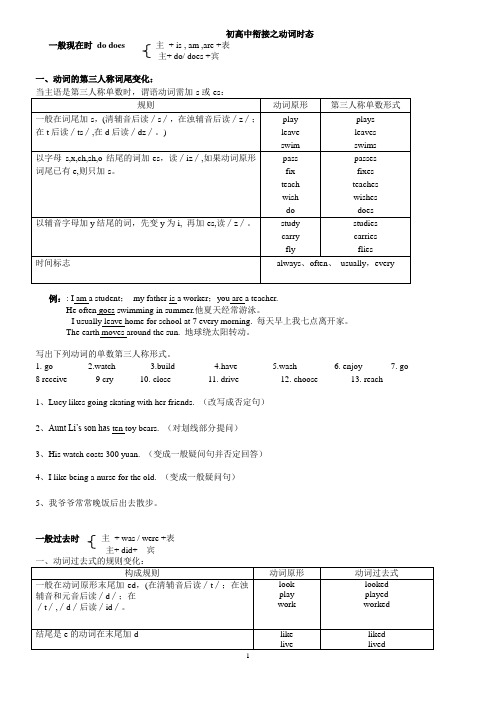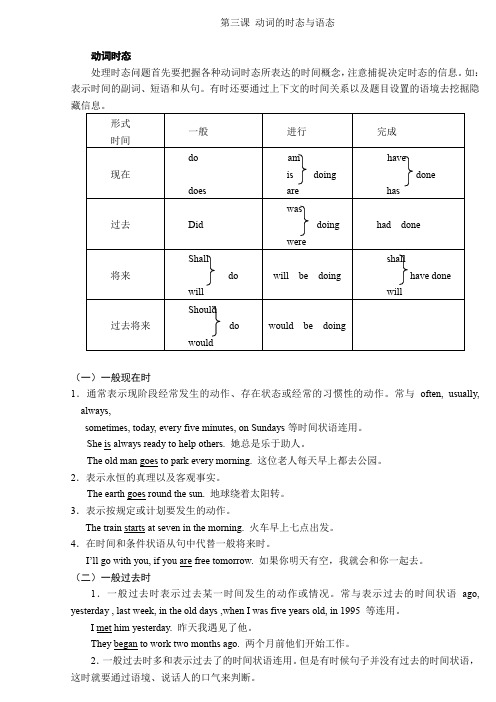初升高衔接 动词语态
- 格式:doc
- 大小:45.00 KB
- 文档页数:4


初高中衔接之动词时态一般现在时 do does主 + is , am ,are +表主+ do/ does +宾一、动词的第三人称词尾变化:例:: I am a student ; my father is a worker ;you are a teacher. He often goes swimming in summer.他夏天经常游泳。
I usually leave home for school at 7 every morning. 每天早上我七点离开家。
The earth moves around the sun. 地球绕太阳转动。
写出下列动词的单数第三人称形式。
1. go _______2.watch________3.build_________4.have________5.wash________6. enjoy ______7. go _________ 8 receive ______9 cry______10. close ________11. drive _______ 12. choose _______13. reach ________1、Lucy likes going skating with her friends. (改写成否定句) ________________________________________________________2、Aunt Li’s son has ten toy bears. (对划线部分提问)________________________________________________________ 3、His watch costs 300 yuan. (变成一般疑问句并否定回答) ________________________________________________________ 4、I like being a nurse for the old. (变成一般疑问句)________________________________________________________ 5、我爷爷常常晚饭后出去散步。

初高中英语语法衔接材料第九讲:动词的时态和语态一、一般时态1. 一般现在时(1)一般现在时的构成一般现在时由动词原形或动词第三人称单数构成。
动词be的第一人称单数形式用am,第三人称单数形式用is,其他人称形式均用are。
动词have的第三(2)一般现在时的用法①表示经常发生的、习惯性的、反复出现的动作或状态。
常与副词(词组)always, every time, now and then, occasionally, often, frequently, constantly, seldom, never, sometimes, usually, every day/night等连用。
The Spring Festival plays a major role in the lives of Chinese people,so various activities are necessary for adding a flavour to the festival.春节在中国人的生活中起着重要的作用,因此为增添节日气氛而进行的各种活动也必不可少。
Mary often goes to work by bus, and he takes a walk with his wife after dinner every day.玛丽经常乘公共汽车去上班,而且每天晚饭后和妻子一块散步。
②按时间表、时刻表、日程表等安排将要发生的动作或事件。
常用于go, arrive, leave, start, stay, return, begin, come, take off等动词(词组)。
Look at the timetable. Hurry up! Flight 4026 takes off at 18:20.看看时间表。
快点儿吧!4026航班将在18:20起飞。
③表示客观真理、科学事实及自然现象。
The sun always rises in the east and sets in the west.太阳总是从东边升起,从西边落下。


第三课动词的时态与语态动词时态处理时态问题首先要把握各种动词时态所表达的时间概念,注意捕捉决定时态的信息。
如:表示时间的副词、短语和从句。
有时还要通过上下文的时间关系以及题目设置的语境去挖掘隐藏信息。
(一)一般现在时1.通常表示现阶段经常发生的动作、存在状态或经常的习惯性的动作。
常与often, usually, always,sometimes, today, every five minutes, on Sundays等时间状语连用。
She is always ready to help others. 她总是乐于助人。
The old man goes to park every morning. 这位老人每天早上都去公园。
2.表示永恒的真理以及客观事实。
The earth goes round the sun. 地球绕着太阳转。
3.表示按规定或计划要发生的动作。
The train starts at seven in the morning. 火车早上七点出发。
4.在时间和条件状语从句中代替一般将来时。
I’ll go with you, if you are free tomorrow. 如果你明天有空,我就会和你一起去。
(二)一般过去时1.一般过去时表示过去某一时间发生的动作或情况。
常与表示过去的时间状语ago, yesterday , last week, in the old days ,when I was five years old, in 1995 等连用。
I met him yesterday. 昨天我遇见了他。
They began to work two months ago. 两个月前他们开始工作。
2.一般过去时多和表示过去了的时间状语连用。
但是有时候句子并没有过去的时间状语,这时就要通过语境、说话人的口气来判断。
He wrote a novel. 他写了一部小说。
I didn’t expect you were waiting for us. 我没预料到你正在等我们。

专题03:动词时态(初高考点差异及衔接)通常要求学生掌握基本的时态,包括一般现在时、一般过去时、一般将来时、现在进行初中要求时、现在完成时等。
除了初中阶段的时态外,还会要求学生掌握更复杂的时态,如过去进行时、过去完成时、高中要求将来进行时、将来完成时等。
【初中考点聚焦】一般现在时:表示经常性或习惯性的动作、状态或普遍真理。
例如,"I go to school by bus every day."一般过去时:表示过去发生的动作或状态。
例如,"He visited his grandparents last weekend."一般将来时:表示将要发生的动作或状态。
例如,"She will go to the library tomorrow."现在进行时:表示现在正在进行的动作。
例如,"They are playing soccer now."现在完成时:表示过去发生的动作对现在有影响或结果。
例如,"I have finished my homework."过去进行时:表示过去某时间正在进行的动作。
如,"He was reading a book when his mother came in."过去完成时:表示在过去某个时间或动作之前已经完成的动作。
例如,"She had finished her homework before her father came home."时态的一致性:在复合句中,特别是条件句和时间状语从句中,主句和从句的时态需要保持一致。
时态的转换:在某些情况下,即使动作发生在过去,也可能使用现在时态,如在间接引语中。
时态的信号词:识别和使用时间状语或时间连词,它们可以提示句子的时态。
不规则动词:掌握一些不规则动词的过去式和过去分词形式。
以上这些考点不仅要求学生能够识别和使用不同的时态,还要求他们能够在写作和口语中正确地运用这些时态,以及在阅读理解中理解时态的含义。
初高中英语知识衔接时态语态讲义初高中英语语法衔接之时态与语态一、动词时态从时间上来看,英语时态可分为“现在”,“过去”,“将来“和”过去将来“四大类。
动词共有十六种不同时态。
但常用的时态有:一般现在时、一般过去时、一般将来时、现在进行时、过去进行时、现在完成时、过去完成时、过去将来时、现在完成进行时、将来完成时和将来进行时I. 一般现在时:1)经常性、习惯性的动作I go to work by bus.2)现在的特征或状态I am a teacher and I teach English.I love sports.3)普遍真理Light travels faster than sound.Water boils at 100℃.2、谓语构成1) 肯定句:谓语用动词原形或第三人称单数Tom’s parents _____ to work by bike every day.Li Tao _______ English every morning.2) 否定句:谓语用don’t/doesn't 加动词原形构成I ________ (not get) up at six every morning.She ____________ (not watch) TV in the evening3) 一般问句:用Do 或Does 加陈述句(谓语动词用原形)---______ he _______ (work) in a plastic factory?---No, he doesn’t.4) 特殊问句:疑问词(when/where/why/what/who/how)加一般问句II. 一般过去时:1、一般过去时用法:句中常有表示过去的时间状语如yesterday, in 1989, once, last week (month, year), at that time, just now等1)表示在过去时间里发生的动作或存在的状态He bought a new bike last week.They were in the office just now.2)表示过去经常或反复发生的动作When I was a small child, I often went to that park and played football.2、谓语构成1)肯定句:谓语用动词的过去式Yesterday, I _____ to a shop and _______ a pen.2)否定句:助动词didn’t 加动词原形She ________(take) any money with her that day.3)一般问句:助动词Did 加陈述句(动词用原形)---____ you _____ to the cinema last night?---No, I didn’t.4)特殊问句:疑问词+ 一般问句---_______ ____ you find your key?---I _______ it under my desk.特殊句式1.It’s time we ________ (have) a rest.2.I would rather he _______ (come) with you.would rather 后从句谓语一般用过去式III. 一般将来时:1、一般将来时用法:表示将要发生的动作或存在的状态I will go to Tibet some day by plane.He will be busy tonight.2、谓语构成肯定句(1)will 加动词原形(第一人称也可用shall )She __________ back in twenty minutes.(2)be going to 加动词原形a.打算,计划做某事I_____________________ a dictionary tomorrow.b. 即将、眼看要发生Look at the dark clouds. It________________ .3)be to 加动词原形:安排好的事We _____________ at the entrance of the park.4)按时刻表进行的, 可用现在时表示将来The plane _________ at a quarter past nine.5)用进行时表示将来They _____________ (leave) tomorrow.能够用于这种表示方法的动词常有:come, leave, go, move, start, arrive, stay6)主句是将来时,条件从句用现在时We ______ (go) to the park if it __________ (not, rain) tomorrow.We _______ (give) it to him when he __________ (arrive).One ____________ (not, learn) English well unless he ___________ (study) hard. If she will make friends with me, I will be happy.否定句:will / shall 加not——won’t / shan’tHe ________ come to the party tomorrow.一般问句:将will 提到句首(第一人称用shall________ you go to the Summer Palace with us?________ we have a break?疑问词+ 一般问句________________ shall we meet next time?_______ is he going to do tomorrow afternoon?________ will he turn to for help?________ shall we do if there is no bus?IV. 现在进行时:1、现在进行时用法:1)表示此时此刻正在进行的动作I am teaching and you are listening to me.2)表示目前这段时间内正在进行的动作He is writing a book this week.3)与always 连用表示赞扬、不满等情绪The girl is always smiling happily.You are always making the same mistake.2、谓语构成:be动词(am, is, are) + 现在分词Tom’s mother ___________ (watch) TV and his father _____________ (read) newspaper.2)否定句在be 动词后加not一般问句只需把be 动词提到句首They _____________ (not, play) football.They _____________ (play) basketball.___ she _______ (do) her homework now?---No, she isn’t. she ___________ (write) a letter.___ she _______ (do) her homework now?---No, she isn’t. she ___________ (write) a letter.V. 过去进行时:1.、过去进行时用法表示过去某一时刻或一段时间内正在进行的动作He was watching TV when I came in.2、谓语构成be 动词(was, were) + 现在分词a. She ___________ (see) a film with her friend this time yesterday.b. We ____________ football when it began to rainVI. 现在完成时:1、现在完成时用法:1)表示动作已经完成(强调发生在过去的动作对现在造成的影响或结果)I have finished my work.He has found his lost key.2)表示从过去某时开始一直延续到现在的动作或状态They have worked in that factory for ten years.2、谓语构成:1)肯定句助动词(have, has) + 过去分词We __________ one hundred apple trees this year.Miss Li _________ an English-Chinese dictionary.2)否定句:在助动词(have, has)后加not——haven’t, hasn’tI ______________ (not, finish) reading the novel.The meeting will begin in five minutes but she _____________ (not, come) yet. 3)一般问句:把助动词(have, has)提到句首---______ you ______ (hand) in your homework?---No, I haven’t.____ he _____ (tell) you the exciting news?---Yes, he has.3、have been 与have gone 的区别He has been to Washington twice. 去过He has gone to Washington. 去了(现在不在这里)VII. 过去完成时:1、过去完成时用法:表示过去某一时间或动作之前已经发生或完成的动作When I arrived, the film __________ (begin).They ___________ (learn) Chinese for a year before they came to China.He ___________ (finish) writing the report by the end of last month.She told us her parents ___________ (work) in the hospital for twenty years.2、过去完成时构成:had + 过去分词When I got home, they ______ (get) supper ready.He said he _________ to Japan twice.VIII. 过去将来时:1、过去将来时用法:表示在过去某一时间看来将要发生的动作He said he would visit the Palace Museum the next week.2、过去将来时构成:would + 动原或was(were) going to + 动原He told me he _________ (take) me to the US the next month.They said they ______________ (not, allow) any reporter to enter their factory.We told her we _________________ (send) her to Beijing.IX. 现在完成进行时:1、用法从过去开始的动作不间断地延续到现在,有可能继续持续下去。
动词语态(初高考点差异及衔接)初中要求8种常见时态的被动语态表达形式:①一般现在时:am/is/are+过去分词;②一般过去时:was/were+过去分词;③现在进行时:am/is/are being+过去分词;④过去进行时:was/were being+过去分词;⑤一般将来时:will be+过去分词;⑥过去将来时:would be+过去分词;⑦现在完成时:has/have been+过去分词;⑧过去完成时:had been+过去分词。
高中要求我们将学习到更复杂的语法结构,因此主动语态和被动语态也会相对复杂一些。
被动语态在高中阶段,因为往往出现在较复杂的句子结构和词汇中,因而需要在学习的时候认真记忆词汇并分析句子结构。
【初中被动语态考点聚焦】考点一一般现在时的被动语态1.Every year in early October,Albuquerque International Balloon Festival is h inAlbuquerque,the biggest city in New Mexico.答案held句意:每年10月初,阿尔伯克基国际热气球节在新墨西哥州最大的城市阿尔伯克基举行。
本题考查动词的语态。
根据句意可知,此处意思是“举行”,且表示被动,故填held 。
2.There is also Hershey,which is well (know)as the chocolate company.答案known短语be well known as...意为“作为……而著名”。
3.It’s also (call)the Double Ninth Festival.答案called它又被称作重阳节。
根据语义可知本句应为被动语态,应用过去分词called 。
4.—How clean your car is!—Thank you.It (wash)very often.答案is washed句意:——你的汽车多干净啊!——谢谢你。
初升高衔接动词语态一、被动语态的基本时态变化被动语态通常为十种时态的被动形式, 被动语态由be+过去分词构成,be随时态的变化而变化。
以do为例,各种时态的被动语态形式为:1) am/is/are +done (过去分词) 一般现在时例Visitors are requested not to touch the exhibits.2)has /have been done 现在完成时例All the preparations for the task have been completed, and we're ready to start.3)am/is /are being done 现在进行时例A new cinema is being built here.4)was/were done 一般过去时例I was given ten minutes to decide whether I should reject the offer.5)had been done 过去完成时例By the end of last year, another new gymnasium had been completed in Beijing.6)was/were being done 过去进行时例A meeting was being held when I was there.二. 被动语态的特殊结构形式1)情态动词的被动:情态动词+be+过去分词。
例The baby should be taken good care of by the baby-sitter.2) 有些动词可以有两个宾语,在用于被动结构时,可以把主动结构中的一个宾语变为主语,另一宾语仍然保留在谓语后面。
通常变为主语的是间接宾语。
例His mother gave him a present for his birthday. 可改为He was given a present by his mother for his birthday.3)使役动词have, make, get以及感官动词see, watch, notice, hear, feel, observe等后面不定式作宾语补语时,在主动结构中不定式to要省略,但变为被动结构时,要加to。
例Someone saw a stranger walk into the building. 可改为A stranger was seen to walk into the building.4)不定式to do 也有被动语态:to be done 。
I don't want to be looked down我不想被小瞧5) It is said that…据说,It is reported that…据报道,It is believed that…大家相信,It is well known that…众所周知。
例It is said that the boy has passed the national exam. (=The boy is said to have passed the national exam. )6)很多动词如break,catch,clean,drive,lock,open,sell,read,write,wash等,当它们被用作不及物动词来描述主语特征时,常用其主动形式表达被动意义,主语通常是物。
例This kind of cloth washes well.7)表示“发生、进行”的词,如:happen, last, take place, break out, come out, come about, come true, run out, give out, turn out等以主动形式表示被动意义。
例How do the newspapers come out? 这些报纸是如何引出来的呢?8)系动词没有被动形式, feel, sound, taste, book, feel等主动表被动。
例Your reason sounds reasonable.9)在need,want,require, bear等词的后面,动名词用主动形式表示被动意义,其含义相当于动词不定式的被动形式。
The house needs repairing(to be repaired).这房子需要修理。
10)形容词worth后面跟动名词的主动形式表示被动含义,但不能跟动词不定式;而worthy后面跟动词不定式的被动形式。
例The picture-book is well worth reading.一、请把下列句子改为被动语态。
1 They write many business letters every day.Many business letters ________ ________ every day.2.Most of the people in that country speak French.French. ___ ___ by most of the people in that country.3.Thousands of people visit the Great Wall every day.The Great Wall ____ _____ by thousand of people.4. Mr Wang set up a private school in that village.A private school __ __up in that village by Mr. Wang.5. They used a new kind of explosive to destroy the old bridge.A new kind of explosive ____ ___ to destroy the old bridge by them.6. We must finish our homework every day.Our homework _____ ____ _____every day.7. My father will buy a new bicycle for me.A new bicycle ____ ____ ____for me by my father.8. The school will award Billy a computer next week.Bill ____ _____ _____a computer next week.9. Nurses must take good care of the babies.Babies ____ ____ ____ good care of by nurses.10. We should praise the boy for his honesty.The boy ____ ____ ____ for honesty by us.二.单选11. The window _______by the naughty boy yesterday.A. breaksB. brokeC. is brokenD. was broken.12.The food and medicine must__at a low temperature.A. keepB. be keptC. keepingD. kept13. The Olympic Games _______ every four years.A. holdB. are heldC. is taken placeD. takes place14. The girls _______ to go out at night.A. isn't allowedB. mustn't allowedC. aren't allowedD. wasn't allowed.15. English ____by many people as a second language.A. are learntB. were learntC. learntD. is learnt16. A Children's Palace _______ by them in that city.A. will builtB. has builtC. will be builtD. are built17. That restaurant _______at that time.A. is welcomedB. was welcomedC. was being welcomedD. welcomes18. New laws _______ to fight pollution.A. will be madeB. will makeC. is madeD. have made20. He _______ doing his homework until his mother came back.A. startedB. will startC. won't startD. didn't start21. Mum, I've ____the table. Can we begin our dinner?A. layB. lainC. laidD. lied22. --- _______ I finish the homework now, Mum?--- No, you _______. You can do it after dinner.A. Must ....needn'tB. Must...mustn'tC. May....can'tD. May.....may23. My father _____walk to work, but now he ____ to work by bike.A. use to...goesB. is used to ....is goingC. used to ...is goingD. used to...goes24.The thieves__by the policemen yesterday afternoon.A. caughtB. are caughtC. were caughtD. had caught25. We _______ keep the new traffic law and learn how to protect ourselves.A. shouldB. mayC. needD. can26. His parents _______ pay for his education.A. doesn't need toB. don't need toC. needn't toD. doesn't have27. Be quiet! The baby _______ in the next room.A. will sleepB. is sleepingC. sleepsD. are sleeping28. The weather report _____it is going to rain tonight.A. saysB. tellsC. speaksD. talks29. _______ children _______ watching cartoons?A. Does....likeB. Are ...likeC. Do ...likeD. Does...likes30. Mike _______ be here now because he has just gone to Washington.A. mustn'tB. needn'tC. shouldn’tD. can't三.完型When I had something difficult to do,I used to ask my mother for help. But she always said, "Do it yourself,dear." I was not 1.____ at all. I thought she was the 2.____ mother in the world!For example,one day,I decided to 3.____ some friends to my home. My bedroom was not in order. Books were everywhere. And I didn't make the bed. I asked my 4.____ to help me clean it,5.____ she still said,"Do it yourself,girl."Because of my "lazy mother",I have to 6._____ my clothes and clean my room. I have to help my parents 7.____ I even have to go to the dentist by myself. It is really hard for me to do everything well,but I have learned 8.____ .As time goes by,I understand my mother. She makes me clever and diligent (勤奋的) 9.____ a great mother!A 10.____ mother is worth(等值于)one hundred teachers! Don't you think so?1. A. old B. glad C. thin2. A. tallest B. most foolish C. laziest3. A. leave B. invite C. visit4. A. mother B. father C. brother5. A. or B. when C. but6. A. wash B. lead C. knock7. A. do housework B. go swimming C. go camping8. A. on show B. by mistake C. a lot9. A. Which B. What C. Who10. A. young B. good C. happy四.阅读Have you ever been ill? When you are ill,you must be unhappy because your body becomes hot,and there are pains all over your body. You don't want to work,you stay in bed,feeling very sad.What makes us ill? It is germs(细菌). Germs are everywhere. They are very small and you can't find them with your eyes,but you can see them with a microscope. They are very small and there could be hundreds of them on a very small thing.Germs are always found in dirty water. When we look at dirty water under the microscope,we shall see them in it. So your father and mother will not let you drink dirty water.Germs aren't found only in water. They are found in air and dust. If you cut your finger,if some of the dust from the floor goes into the cut(割开处),some of the germs would go into your finger. Your finger would become big and red,and you will have much pain in it. Sometimes the germs would go into all of your body,and you would have pain everywhere.1. Which of the following is TRUE?A. If things are very small,they are germs.B. If things can't be seen,they must be germs.C. Germs are only in dirty water.D. Germs are everywhere around us.2. What is a microscope used for?A. Making very small things look much bigger.B. Making very big things look much smaller.C. Helping you read some newspapers.D. Helping you if you can't see things clearly.3. Why don't your parents let you drink dirty water?A. You haven't looked at it carefully.B. Water can't be drunk in this way.C. There must be lots of germs in it.D. Water will make you ill.4. Which of the following is NOT true?A. Germs can be found both in water and in the air.B. Germs can go into your finger if it is cut.C. If your temperature is not OK,there must be germs in your body.D. If your finger isn't cut,there aren't any germs on it.5. What's the main idea of the passage?A. Germs may make us ill.B. Germs are in dirty water.C. Don't drink dirty water.D. Take care of your fingers.五.短文改错Dear Peter,Thanks very much on inviting me to your birthday 1.______party on Sunday.I’d like very much come,but 2.______I had an examination on Monday morning.It is 3.______a very important exam,but I can’t afford to 4.______fail it.I’ll spend all the whole weekend reading 5.______and prepare for it.So I’m really sorry that 6.______I won’t able to come this time.Hope you 7.______can understand.I’ll take this chance to wish 8.______you a wonderful time in your birthday.Happy 9.______birthday,Peter,and many happy return of the day!10.______Yours,Li Ming六.书面根据下面的提示,以“Talking about Having Sports”为题编写一段对话(字数:80--120)。